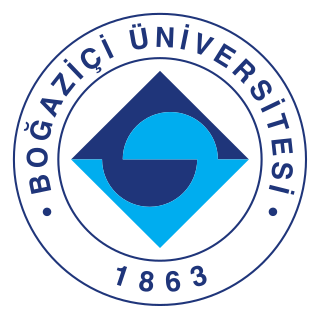
Boğaziçi University, also known as Bosphorus University, is a prominent public research university in Istanbul, Turkey, historically tied to a former American educational institution, Robert College. Robert College was the first American college to be founded outside the United States. The main campus of Boğaziçi University is located on the European side of the Bosphorus strait. It has seven faculties and two schools offering undergraduate degrees and seven institutes offering graduate degrees. Traditionally, the language of instruction is English.
Article 301 is a lèse-majesté law of the Turkish Penal Code making it illegal to insult Turkey, the Turkish nation, Turkish government institutions, or Turkish national heroes such as Mustafa Kemal Atatürk. It took effect on June 1, 2005, and was introduced as part of a package of penal law reform in the process preceding the opening of negotiations for Turkish membership of the European Union (EU), in order to bring Turkey up to EU standards. The original version of the article made it a crime to "insult Turkishness"; on April 30, 2008, the article was amended to change "Turkishness" into "the Turkish nation". Since this article became law, charges have been brought in more than 60 cases, some of which are high-profile.
Perihan Mağden is a Turkish writer. She was a columnist for the newspaper Taraf. She was tried and acquitted for calling for opening the possibility of conscientious objection to mandatory military service in Turkey.
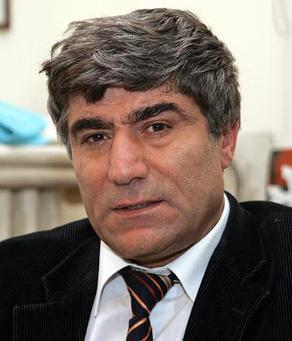
Hrant Dink was a Turkish-Armenian intellectual, editor-in-chief of Agos, journalist, and columnist. As editor-in-chief of the bilingual Turkish-Armenian newspaper Agos, Dink was a prominent member of the Armenian minority in Turkey best known for advocating Turkish–Armenian reconciliation and human and minority rights in Turkey. He was often critical of both Turkey's denial of the Armenian genocide and of the Armenian diaspora's campaign for its international recognition. Dink was prosecuted three times for denigrating Turkishness, while receiving numerous death threats from Turkish nationalists.
Yasin Hayal is a Turkish criminal who was sentenced to a life sentence for inciting the assassination of Turkish Armenian journalist Hrant Dink. He has served a ten-month prison term for bombing a McDonald's restaurant in the city of Trabzon, Turkey. He has been on trial for inciting Ogün Samast to assassinate Turkish Armenian journalist Hrant Dink. On January 16, 2012, Hayal was found guilty of soliciting Dink's murder by a Turkish court and sentenced to life imprisonment. The ruling was later abolished, and in a new trial Hayal was sentenced to 7 and a half years imprisonment in July 2019, this time for being in charge of an armed group.
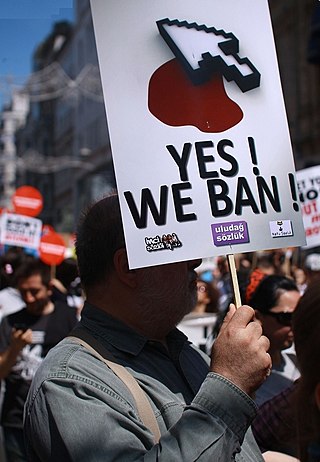
Censorship in Turkey is regulated by domestic and international legislation, the latter taking precedence over domestic law, according to Article 90 of the Constitution of Turkey.
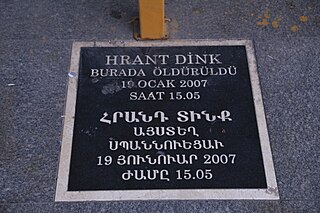
The prominent Turkish-Armenian journalist Hrant Dink was assassinated in Istanbul on 19 January 2007. Dink was a newspaper editor who had written and spoken about the Armenian genocide and was well known for his efforts for reconciliation between Turks and Armenians and his advocacy of human and minority rights in Turkey. At the time of his death, he was on trial for violating Article 301 of the Turkish Penal Code and "denigrating Turkishness". His murder sparked both massive national protests in Turkey itself as well as widespread international outrage.
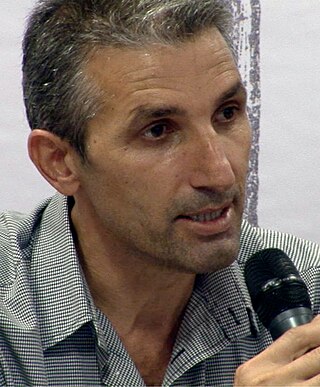
Nedim Şener is a Turkish writer and journalist who has written for the Milliyet and Posta newspapers. He has received a number of journalism awards, including the Turkish Journalists' Association Press Freedom Award, the International Press Institute's World Press Freedom Heroes award, and PEN Freedom of Expression Award. He is particularly known for his 2009 book on the assassination of Hrant Dink, which showed the role of Turkish security. He is under indictment in the Odatv case of the Ergenekon trials because, he believes, his 2009 book alleged that police officers responsible for the Ergenekon investigation were responsible for the Dink murder.

In Turkey, xenophobia and discrimination are present in its society and throughout its history, including ethnic discrimination, religious discrimination and institutional racism against non-Muslim and non-Sunni minorities. This appears mainly in the form of negative attitudes and actions by some people towards people who are not considered ethnically Turkish, notably Kurds, Armenians, Arabs, Assyrians, Greeks, Jews, and peripatetic groups like Romani people, Domari, Abdals and Lom.

A wave of demonstrations and civil unrest in Turkey began on 28 May 2013, initially to contest the urban development plan for Istanbul's Taksim Gezi Park. The protests were sparked by outrage at the violent eviction of a sit-in at the park protesting the plan. Subsequently, supporting protests and strikes took place across Turkey, protesting against a wide range of concerns at the core of which were issues of freedom of the press, of expression and of assembly, as well as the AKP government's erosion of Turkey's secularism. With no centralised leadership beyond the small assembly that organised the original environmental protest, the protests have been compared to the Occupy movement and the May 1968 events. Social media played a key part in the protests, not least because much of the Turkish media downplayed the protests, particularly in the early stages. Three and a half million people are estimated to have taken an active part in almost 5,000 demonstrations across Turkey connected with the original Gezi Park protest. Twenty-two people were killed and more than 8,000 were injured, many critically.

Amberin Zaman is a Turkish journalist and a chief correspondent for Al-Monitor based in London covers major stories on the MENA. Having started as a journalist in the early 1990s in Turkey, Zaman contributes to various newspapers throughout the world. Her reporting focuses on geopolitical trends, conflicts, diplomacy and human rights. She studied political science at Franklin College in Lugano Switzerland, speaks fluent English, French, Turkish and Bengali.

Garo Paylan is a politician from Turkey and one of the country's leading democracy activists. Paylan was among the few Armenians elected to the Grand National Assembly of Turkey and served for two consecutive terms in 2015–2018 and 2018–2023, representing Istanbul and Diyarbakir. He is a founding member of the Peoples' Democratic Party (HDP) and since 2016 was the first Armenian in the history of the Republic of Turkey to publicly discuss the Armenian genocide of 1915 from the podium of the Turkish parliament. Paylan is recognized for his activism on human rights and minority rights in Turkey and has been the recipient of several awards, including the Grand Vermeil Medal and has been twice nominated for the Nobel peace prize.

Mehmet Osman Kavala is a Turkish economist, businessman, human rights defender, philanthropist and civil society activist who has supported numerous civil society organizations in Turkey since the early 1990s. Kavala is the founder and chair of the board of Anadolu Kültür, an Istanbul-based nonprofit arts and culture organization. In 2019, he received the European Archaeological Heritage Prize from the European Association of Archaeologists for his efforts to protect and preserve significant examples of cultural heritage in danger in Turkey and the Ayşenur Zarakolu Freedom of Thought and Expression Award by Human Rights Association's Istanbul branch. His arrests in Turkey caused the European Court of Human Rights and ambassadors from ten Western countries to demand his release. These demands were rejected by Turkish courts and president Erdoğan.
Rakel Dink is a Turkish Armenian human rights activist and head of the Hrant Dink Foundation.
The Academics for Peace refers to an association of academics who support a peaceful solution to the Kurdish Turkish conflict. They were established in November 2012 and their first public appearance was in support of hunger strikers in Turkish prisons.
Hrant Dink Foundation is an organization established following the 2007 assassination of Hrant Dink, a prominent Turkish-Armenian journalist, in order to "carry on Hrant’s dreams, Hrant’s struggle, Hrant’s language and Hrant’s heart". Among the organization's specific goals are to monitor hate speech in Turkey, to study history from a non-nationalist perspective especially using oral history, build relationships between Turkey, Armenia and Europe, and improve democratization and human rights in Turkey.
Ayşe Gül Altınay is a Turkish academic working in the disciplines of anthropology, cultural studies, and gender studies, focusing especially on militarism, violence, and memory. She is a professor of anthropology at Sabancı University and director of the university's Gender and Women's Studies Center of Excellence. Altınay stated that "the main question that shapes my work and my life" is "Are we going to turn our pain into more violence, hate, pain and injustice, or into steps that multiply life, beauty, love, peace and justice?" She is a signatory of the Academics for Peace petition "We will not be party to this crime!" and advocates a peaceful resolution of the Kurdish-Turkish conflict.

Şebnem Korur Fincancı is a Turkish medic, former professor, and current president of the Turkish Medical Association (TBB). She is an internationally renowned expert on human rights and a member of the Turkish Human Rights Association (TİHV). In Turkish popular culture she is being called to be the "Turkish female villain".
Camp Armen or also known as Tuzla Armenian Orphanage is an Armenian orphanage in Tuzla, owned by the Gedikpaşa Surp Hovhannes Church.











